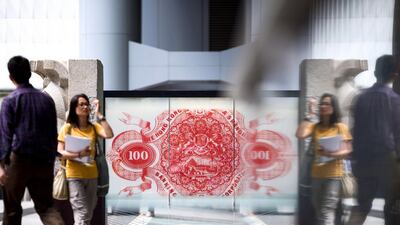HSBC has stressed the importance of the UAE and Middle East to its global operations amid a strategic overhaul.
The new measures will result in its exit from key markets and the shedding of up to a fifth of its global workforce as it seeks to increase profits.
In what HSBC described as “a significant reshaping of its business portfolio”, Europe’s largest bank yesterday announced plans to reduce its global assets by at least 25 per cent, about US$290 billion, while accelerating investments in fast-growing markets such as Asia.
HSBC is moving to cut costs and boost profits after a series of regulatory setbacks over the past four years.
The UAE, Saudi Arabia and Egypt were among 18 territories the bank was prioritising as part of its optimised global network, HSBC chief executive Stuart Gulliver told analysts in London yesterday.
The Middle East and North Africa (Mena) region delivered about 4 per cent of the bank’s revenues, but accounted for 10 per cent of its profits, said Jaap Meijer, Arqaam Capital’s managing director of research.
"HSBC obviously continues to see Mena as one of its key growth areas, with growth for the next decade only eclipsed by Greater China," he said.
The lender also aims to focus on its fast-growing markets in Asia such as Malaysia and China’s Pearl River Delta, which comprises the manufacturing and trade centre of Guangdong and Hong Kong.
Mr Gulliver said: “The world is increasingly connected, with Asia expected to show high growth and become the centre of global trade over the next decade.
“I am confident that our actions will allow us to capture expected future growth opportunities and deliver further value to shareholders.”
As part of the shift towards Asia, HSBC announced it would sell its operations in Turkey and Brazil, which would result in the cutting of its workforce by 25,000.
The bank also said it planned to cut a further 22,000 to 25,000 jobs globally by the end of 2017.
About 8,000 of these job losses are expected to be borne by its UK operations.
The bank declined to comment on whether its operations in the UAE would also suffer job cuts.
Mr Gulliver said that the HSBC brand would no longer be used for the bank’s UK branch network, as part of an effort to ring-fence its retail operations in compliance with local regulations.
The bank, which ordered a review in April on whether to move its global headquarters from Britain to Hong Kong, said it would make a decision on the matter by the end of the year.
HSBC has been battered by a series of regulatory setbacks since 2011, incurring $11.2bn worth of charges, including $5.7bn related to the mis-selling of payment protection insurance in Britain.
The bank’s global compliance staff has more than doubled to 7,200 since 2011.
Such issues have affected HSBC’s bottom line. In February the bank posted a 17 per cent fall in annual pretax profits to $18.7bn, far below analyst forecasts. The bank plans to enact annual cost-saving initiatives of between $4.5bn and $5bn by 2017.
HSBC shares, listed on the London Stock Exchange, closed about 1 per cent down at 613.70 pence yesterday.
jeverington@thenational.ae
Follow The National's Business section on Twitter

